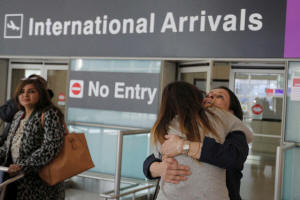|
Challenges to Trump's travel ban abound
in courts across U.S.
 Send a link to a friend
Send a link to a friend
 [February 10, 2017]
By Mica Rosenberg [February 10, 2017]
By Mica Rosenberg
NEW YORK (Reuters) - A U.S. appeal courtís
refusal to reinstate a temporary travel ban on refugees and citizens
from seven mainly Muslim countries is a setback for U.S. President
Donald Trumpís sweeping immigration agenda, but the government is
pressing ahead on multiple legal fronts.
The administration will continue to defend the executive order - both in
the Washington case that produced Thursday's ruling and possibly at the
Supreme Court - and in more than a dozen additional lawsuits now moving
through the U.S. court system.
On Friday, a federal court in Virginia will hold a hearing on a request
for a preliminary injunction on aspects of the ban in a case brought by
the state of Virginia on behalf of lawful permanent residents detained
at Dulles International Airport or denied entry after the ban went into
effect.
Some of the cases were filed on behalf of travelers from the countries
affected by the ban who were detained at U.S. airports upon arriving in
the country.
Others have been filed by states, civil liberties groups and refugee
resettlement agencies with companies and non-profit organizations
joining in with supporting briefs.
The American Civil Liberties Union filed a suit on behalf of all the
affected people who were in transit at the time the ban took effect or
who were detained on arrival in the United States, including two Iraqis
with connections to the U.S. military.

A district judge in Brooklyn issued a nationwide emergency order, which
is still in place, preventing the removal of such travelers.
Federal District Judge Nathaniel Gorton in Boston ruled very
differently, upholding the president's order in a case originally
brought on behalf of two Iranian permanent residents of the United
States who were detained on arriving at the Boston airport.
That decision was in sharp contrast with the ruling by Seattle-based
James Robart, who imposed the emergency halt to Trump's order upheld by
the appelate court on Thursday.
Trump praised Gorton and blasted Robart on Twitter, saying "Why aren't
the lawyers looking at and using the Federal Court decision in Boston,
which is at conflict with ridiculous lift ban decision?"
CASES FILED ACROSS THE U.S.
The large number of cases in different courthouses around the country
increases the likelihood that the U.S. Supreme Court will ultimately
have to decide the fate of the policy.
[to top of second column] |

Shanez Tabarsi (R) is greeted by her daughter Negin after traveling
to the U.S. from Iran following a federal court's temporary stay of
U.S. President Donald Trump's executive order travel ban at Logan
Airport in Boston, Massachusetts, U.S. February 6, 2017.
REUTERS/Brian Snyder

There are now cases moving through 11 of the 13 U.S. appeals court
circuits in the nation. And that does not include many additional
habeas petitions filed on behalf of individual people detained at
airports after the ban, the majority of which would have been
dropped after people were released.
"Currently the front-running case is in Washington and all eyes are
on that case, but there a lot of other cases back-stopping that case
and ready to step in if the order were to be reinstated," Melissa
Keaney, a staff attorney with National Immigration Law Center.
The ACLU is involved in at least a dozen of the cases but says that
the litigation has been moving too quickly to coordinate nationally.
"I don't see anyone stopping to move forward with their own cases
until there is a definitive resolution," said Lee Gelernt, an ACLU
attorney handling the Brooklyn suit. "That would mean either the
Supreme Court rules on the issue, or the administration decides to
change the executive order or the government decides not to appeal
if there is a nationwide ruling against it," Gelernt said.
Given the pace of everything, Jay Holland, an attorney with Joseph
Greenwald & Laake who has litigated cases involving civil rights
issues, said it was "not so surprising that different lawyers and
different judges are cutting their own path."
He expects the issue to move quickly to the Supreme Court, which is
still short one justice ahead of the confirmation of Trump's
conservative nominee Neil Gorsuch to the bench.

"Even with eight justices, I think the court will be forced to take
it up because there will be too many conflicting opinions," said
Holland. "There is far too much legal uncertainty that is having
immediate impact."
(Reporting by Mica Rosenberg; Editing by Michael Perry)
[© 2017 Thomson Reuters. All rights
reserved.]
Copyright 2017 Reuters. All rights reserved. This material may not be published,
broadcast, rewritten or redistributed. |